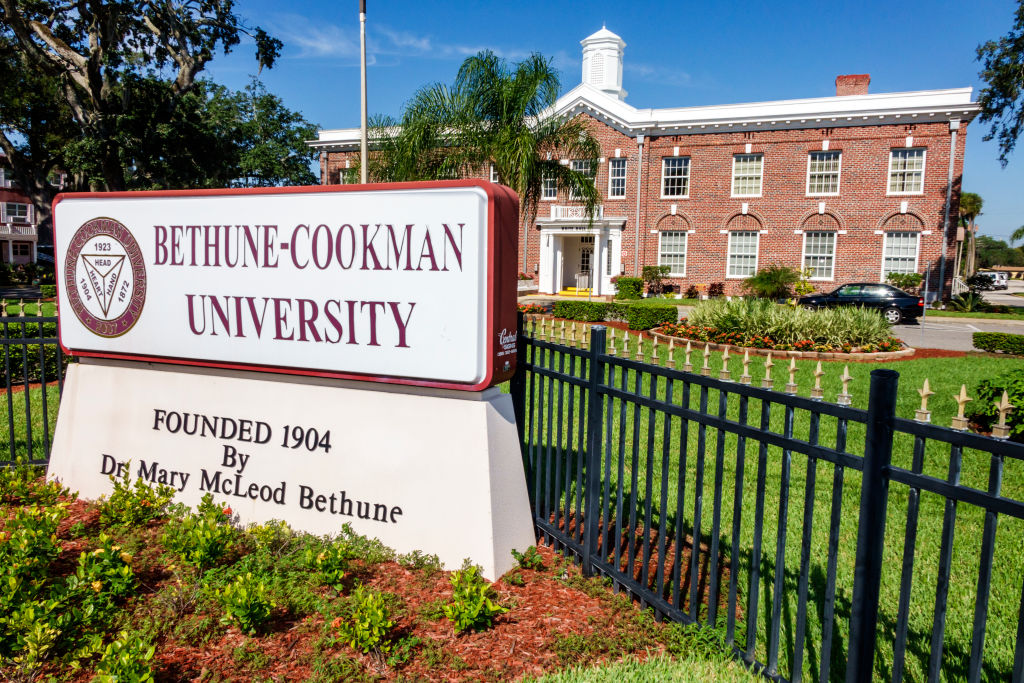
Source: Jeff Greenberg / Getty
In the wake of housing crises, disbanded contracts and scandalous superstar coaches, it seems as though HBCUs are in the hot seat every few months, and less and less for good reason. Instead of these dimmer moments being resolved with consideration and call to action by those of the community, more flack is put onto the institutions for what they did not do right. We must uplift and support our institutions, even through their trespasses, as belittlement is only counterproductive to what is ultimately the goal for our schools.
Most recently, with the Ed Reed and the Bethune-Cookman controversy, after his offensive comments about the state of the campus and its student culture, the university subsequently revoked their offer to the NFL Hall of Famer. The original coaching contract was supposed to be in step with how Jackson State’s football program was improving under the leadership and vision of coach Deion “Primetime” Sanders. The decision to terminate the contract before Reed ever coached a game was met with a polarizing reaction, with public opinion split on who was at greater fault for the partnership’s demise. The school’s official statement showed that their sentiments were clear, “As we continued to observe him, we felt that his behavior was not aligned with the traditions of our founder, Dr. Mary McLeod Bethune, and the university.”
When news broke of the incident, feelings of condescension and ridicule from his words were not overdramatized, as many argued that Reed’s public statements regarding the school’s conditions were excessively negative. There was a haughty undertone to his words, and Bethune-Cookman made it clear that their university was not a charity case, and dignity and integrity were not things they were willing to bend on for a coach to recruit five star athletes. Reed, by no means, is completely innocent in the matter, and neither is Bethune-Cookman. Both ended up hurting who is most important, the students who make up the heart of the university.
After the swift termination, many took to social media to express their discontent not only of his forced early departure, but also of the school’s other faults as well. Moldy dorms and incompetent administrators plagued the campus, and its student body that deserved more. Protests erupted onto the Florida school’s grounds, calling for drastic action to resolve the very problems Reed made note of, albeit in a crass way.
The school, which pointed out that they were rehabilitating the facilities after enduring two hurricanes within the past year, was called out by its student protestors about the infrastructure concerns they are bashing Reed for pointing out, yet stalled in resolving. Reed could have taken this time to align with the students and utilize his platform further to potentially help the underfunded school, but communications broke down and disassociation grew. This left the students to put their campus and community into their own hands to call for an facility overhaul.
HBCUs get enough vitriol as is for the systemic issues that, while partly at fault of the administration’s mismanagement of funding, is also partly due to lack of resources that PWIs will always have more of. HBCUs are not running the same race, yet are bashed when they trip over the hurdles other schools they do not encounter in their lanes. Listening and prioritizing the voices of the students, on both the administrators and donors end, is essential for improving the very spaces they need.
An HBCU education is not a contest for who can pool the greatest resources or personnel, but an experience all Black students should be able to receive in a bountiful environment in which they feel safe. Undermining the very institutions that, at the end of the day, were built with that purpose and vision will always do more harm than good. Whether that is Howard, where systemic racism and gentrification play a significant role in its lack of affordable housing given its location of D.C., or Bethune Cookman, as it is overwhelmed by the destruction caused by natural disaster and minimal resources.
Even when our institutions fall to their lowest point, the determination and belief in what the school was founded for remains steadfast. This point aligns with the plight of Morris Brown College. The fourth member of the Atlanta University Center essentially became a ghost of itself after falling under financial ruin after mismanagement and losing its accreditation. However, its alumni and faculty did not give up on the beloved university, and today it has not only become reaccredited, but it also received its largest grant in two decades. Their work towards rebuilding Morris Brown back to its former glory is proof that we cannot forsake our institutions, as they are all instilled with fellow HBCU Clark-Atlanta University’s mantra of “find a way or make one.”
In a society that diminishes the impact and quality of Black founded or Black-centered businesses, art, and educational entities, those whose values align with uplifting these opportunities must be open to see them through even as they learn on the way.
This goes for our schools especially, as despite their shortcomings, are still the pipelines for Black artists, engineers, doctors and educators. The questions we should be asking are not simply what have you done, but how can we help moving forward.
RELATED CONTENT: AT&T Executive Michelle Jordan Shows HBCU Students How To Dream In Black









